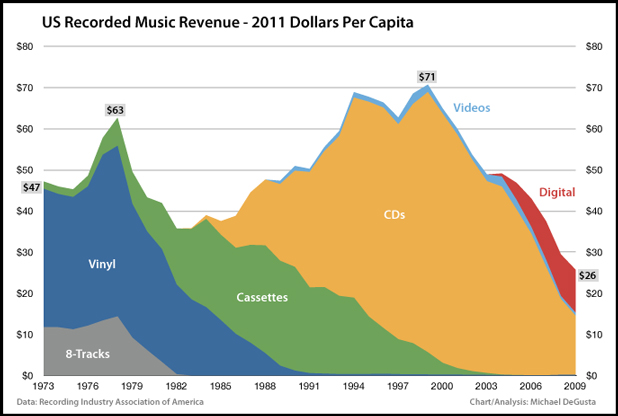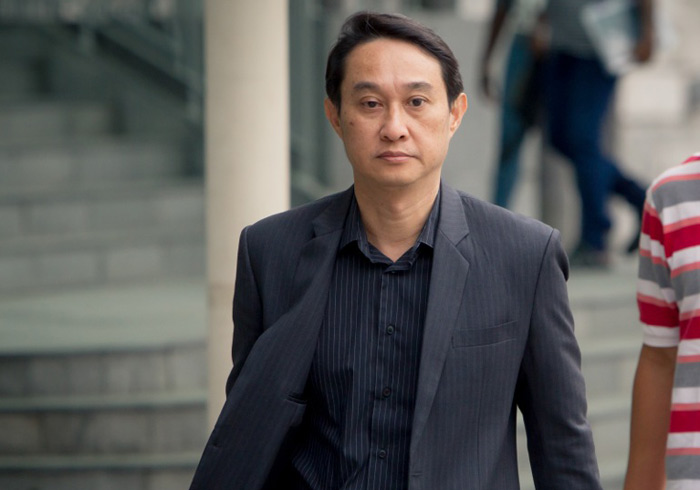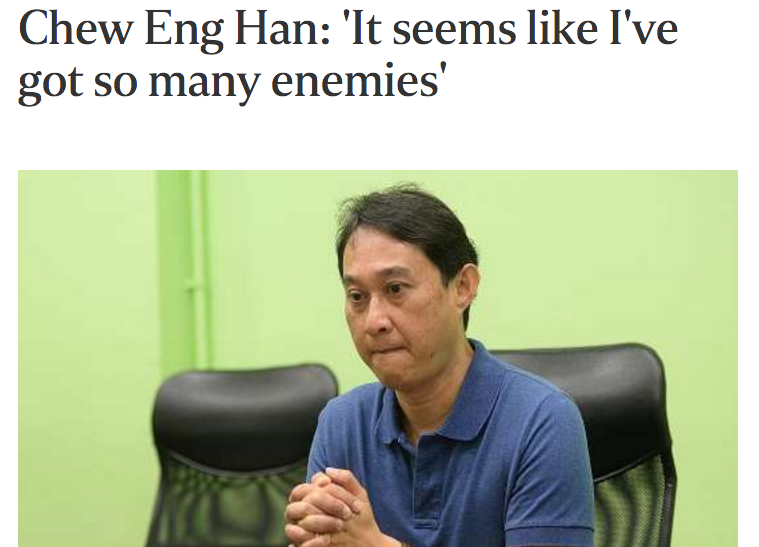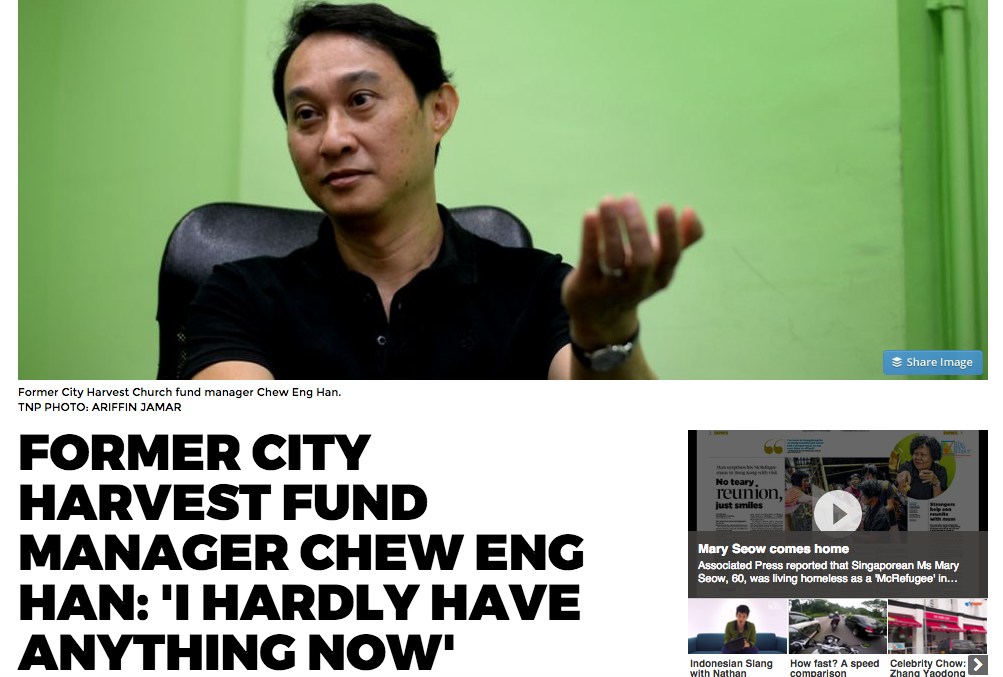Out of the six convicted City Harvest Church (CHC) leaders who went through a trial that spanned more than three years, only one saw sense and left the church in 2013.
In his sentencing on Friday, presiding judge See Kee Oon determined the man with the second-most culpability in the case was fund manager Chew Eng Han. Sentenced to six years' jail, two shy of church founder Kong Hee's eight, Chew was according to See, as quoted in local media, seen as the financial expertise to Kong's spiritual leadership.
As the church's investment manager, the judge said that several of the accused relied on his expertise and opinions before making decisions. Chew was also the one who came up with the idea to issue bonds that were used to funnel millions of dollars toward the "Crossover Project" — where Kong's wife Sun Ho was to use a hopefully-successful pop music career to "win souls" for God.
Now, apart from facing a $21 million lawsuit from CHC, which is making a bid to claw back loans given to his company, AMAC Capital Partners, for investments, Chew has so far been the only one who confirmed that he is appealing both the court's verdict and sentence against him.
It seems that before Judicial Commissioner See's verdict was handed out on October 21, though, Chew sat down with a reporter from The Straits Times's Sunday paper for an interview, which was held back for a month (because publishing it before the verdict or sentencing would have been sub judice) before being published on Sunday:
In case you're lazy to read it — here's the gist of the interview:
- He said his fund management business has gone "belly up".
- He repeated his central defence, which is that his bonds were legitimate — just that the Crossover (and its success) was a sham.
"We expected to make money from (Sun Ho's albums), and Sun was meant to get souls saved; this was the best thing the church would ever do. But, as it turns out, the album was a sham. The Crossover was a sham. The bond was a good bond — what went on behind the scene made it look like a sham."
- He said he initially believed in the Crossover project, believing Kong that Ho was "making inroads" among youth during her concerts, as well as "shaking Christians out from their slumber".
- He also saw the way CHC did things as being "so different from other churches, always at the forefront of new things".
He noted that in the wake of former church member Roland Poon's accusations in 2003, Kong declared to his followers that "not a single cent" was funnelled toward Ho's music career, but yet made on-paper arrangements to separate the church from it.
"Not everything done in secrecy is a conspiracy," Chew was quoted as saying, adding that church members were repeatedly told of the thousands of souls Ho was "saving" at her concerts.
- He said he felt uncomfortable when he saw Ho's music videos, but said he still believed in the mission out of loyalty to Kong and Ho.
- He described a meeting the six had with the church's lawyer where Kong kept silent, a stark contrast to his outright denial seven years prior. The article then relates the revelation of $2.1 million of church funds channelled through an affiliate Kuala Lumpur church to the Crossover project, as well as the multi-purpose account where $600,000 went directly into Kong's pockets.
- He said he confronted Kong about the above, where Kong simply responded by asking him if he was still on his side. When Chew urged Kong to "just apologise and repent" by coming clean, and he didn't, that was his last straw, where he finally left, in a signal he hoped to send to others to think about the church more critically.
Reading the story, however, left us with a few more questions than answers:
1. Why did The Straits Times interview Chew before the case was over, i.e. post-verdict and sentencing?
They certainly would have been able to speak to him in greater detail about the case and his involvement in it if his innocence wasn't still being considered by the court.
At this point, bear in mind also that anything Chew said would have been without knowing what the outcome of the case would be — naturally, therefore, he has a motivation to either conceal certain details or play things up in a way that could favour his case.
So the timing of this interview is curious to us — especially because they asked him questions specifically about the case and his defence. These should certainly have waited till its outcome was known.
We're also wondering why, since they were asking questions directly about the case, ST didn't seem to have asked him these two questions we think are pretty central to his case:
2. If Chew issued bonds that were legitimate, why wasn't he transparent with the church's auditors about the way the money was moved?
As the key man in charge of figuring out how to invest the millions that moved through CHC's coffers, the case showed that it was Chew who designed the series of bond investments that got them in trouble for moving money around (from the church's building fund to Xtron Productions to Ho's music career), while hiding it from their auditors.
And well, one would think that the moment one is moving money on the quiet, and concealing it from auditors, there must be a problem somewhere. Somehow, this question wasn't addressed in this interview — unless it was supposed to be answered with "Not everything done in secrecy is a conspiracy".
3. What investment manager would plough millions of dollars into something based on an assurance given by one person?
This, after all, is essentially what Chew is claiming to have done — he says he believed Kong when he said his wife would surely succeed and reap all the investments the church was going to make into launching her music career in America.
Now, if Chew is an investor worth his salt, clearly, he would know that diversification is key, since every investment carries risk. And even when investing money somewhere, he would also have had to do much research into that place before being able to entrust millions of dollars to it — because doing so implies belief in its future success that will reap returns.
Despite these two basic points, he defends himself by saying he acted taking Kong's word for truth, and what we suppose he saw at the time as sound investment advice for the church.
4. More specifically, which investment manager would plough millions of dollars into an industry that is clearly ailing?
Ho's Crossover into the U.S. market began in 2003, with her first English single "Where Did Love Go". It was also that year that she moved to Los Angeles to build her career there.
Here's the research we're wondering if Chew did:
 Source: Business Insider
Source: Business Insider
You may need to hold a ruler to the screen the way we did, but if one were to look at the pre-2003 trend of CD sales (the chrome yellow area of the graph), they only peaked in about 1998 or 1999 at close to US$70 million.
From that point, though, you can see a very stark downward slide in CD sales, and around 2003, it was hovering in the US$50 million region, markedly below what it was in the 1990s.
Add this info to a (to be fair 20/20 hindsight) story by The New Paper, where an American music career consultant was quoted as saying the U.S. music industry was on a downward spiral by the time she made her bid to break into it.
Need we say more?
Anyway, it seems Chew was quite happy to talk to the media at the close of the case, since he also spoke to The New Paper:
In this story, TNP focused chiefly on the multi-purpose account Kong and Ho had that was funded by a group of church members, in lieu of them drawing salaries from the church. But we learned a bit about his backstory that shed some light on his case; perhaps because their interview was done later — between the verdict and Chew's sentencing.
Here's what he said in this interview:
- So we know about Kong and Ho's "multi-purpose account" that several CHC members donated to willingly in lieu of salaries from the church in order to fund their lifestyles, right — what Chew shared is Kong lied to them (him included) about being in deficit in order to convince them to give more.
Between 2007 and 2009, neither Kong nor Ho shared how much money they had collected or how they spent it, or even who else was donating to them — until 2010, when Kong produced a "spreadsheet" that apparently highlighted a shortfall.
"He wanted more money... So he gives us an impression that the collection from us is not enough to cover the expenses.
Then, he gave us a form to write down how much more we think we can increase our gifts in the coming year, and the aim was to try to prod us to achieve a certain targeted amount."
The details of just how much cash the pair were rolling around in only emerged during investigations, with Serina Wee concealing Ho's $400,000 in salary, royalties and bonuses for her music career because it "is very sensitive".
- Two years after he joined the church in 1995, he became a cell group leader, and joined the board in 1999, while working as the head of State Street Bank.
He said he thinks his being chosen was partly because there weren't as many wealthy members with the church at that time:
“He probably chose me as well because at that time, there were not many professionals working in the church (who were) earning so much money.
I never felt attracted to the position. To me (it) was just a chance to serve even more effectively.”
The reporters in this instance didn't really put questions to Chew about the case directly, but the TNP story does give us insight into Chew's rage, which likely continues today.
Which brings us to our last question:
5. Will the mainstream media — The Straits Times and The New Paper — be providing the other side of the CHC story too?
Both papers chose to gave voice to Chew's side, very likely because he was probably more willing to share his story than the other five.
To be fair, the rest don't seem to be saying all that much — even church mouthpiece affiliated website City News has yet to carry any interviews with any of the remaining five folks — but it would be interesting to hear what Kong and the rest of the church leadership would have to say about Chew's account of events. Especially that multi-million-dollar multi-purpose account.
This is important because at the moment, the stories told — naturally — show Chew as a victim in some sense.
We're keen to see what Chew plans to say in his appeals, though, which he has till December 2 to file. And while we're at it, if anyone else files appeals.
Top photo from City News.
If you like what you read, follow us on Facebook and Twitter to get the latest updates.
If you like what you read, follow us on Facebook, Instagram, Twitter and Telegram to get the latest updates.


